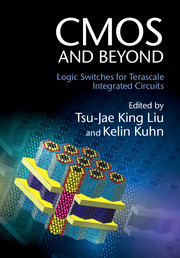Preface
Published online by Cambridge University Press: 05 February 2015
Summary
Steady miniaturization of CMOS (complementary metal–oxide–semiconductor) transistors – the predominant type of electrical switches used in digital integrated circuit “chips” – has yielded continual improvements in the performance and cost-per-function of electronic devices over the past four decades. This relentless miniaturization has resulted in ubiquitous information technology with dramatic global impact on virtually every aspect of life in modern society.
CMOS technology is reaching a state of maturity wherein continued transistor scaling will not be as straightforward in the future as it has been in the past. This is already apparent from the slowdown in certain aspects of scaling (e.g., chip supply voltage scaling, transistor off-state leakage current scaling, and so on). Clearly, improved switch designs will be needed to sustain the growth of the electronics industry beyond the next decade. A wide variety of alternative switch designs are being discussed in the research community, many of which use operating principles dramatically different from those of conventional CMOS transistors. Unfortunately, papers published by the research community in rapidly developing fields are rarely tutorial. Thus, much of this important new information is not readily comprehensible to the mainstream electronics community.
To help address this communication gap, we approached recognized experts in the research community with requests to create tutorial essays in their area of speciality. This book organizes these essays into sections, beginning with background information on the power–performance trade-off (motivating steep sub-threshold swing devices), continuing with tunneling-based devices, alternative field effect devices, and spin-based (magnetic) devices. It closes by reviewing the challenges of interconnects for these evolving new switch designs.
- Type
- Chapter
- Information
- CMOS and BeyondLogic Switches for Terascale Integrated Circuits, pp. xv - xviiiPublisher: Cambridge University PressPrint publication year: 2015



